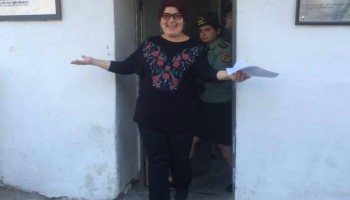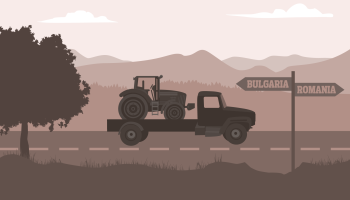Said OCCRP editor Andrew Sullivan, “We face more and more pressure on an annual basis from tin-pot dictators to murderous organized crime figures. It shouldn't be this dangerous to tell the truth. We need universal support for investigative reporting. Too many voices have been silenced.”
He noted that while moral support is much appreciated, journalists increasingly need financial support. “We can't do this on a shoestring forever,” he said. “We must empower the last independent voices in many countries with real, substantial and ongoing support. Investigative reporting means too much to all of us.”
In perhaps the most egregious example of media repression, Azerbaijani reporter Khadija Ismayilova was scheduled today to receive the 2016 UNESCO/Guillermo Cano World Press Freedom Prize in Helsinki, Finland. She, of course, could not attend the ceremony because she is currently in jail.
Ismayilova is serving a 7.5-year sentence on charges of abuse of power and tax evasion, charges commonly used to harass, intimidate and silence journalists throughout the region. Human rights groups have denounced the charges as politically motivated.
Emin Milli, managing director of OCCRP partner Meydan TV, finds it ironic that Azerbaijan’s First Lady Mehriban Aliyeva is a UNESCO Goodwill Ambassador as Ismayilova’s reporting revealed extensive corruption connected to the Aliyev family. Milli joined Ismayilova’s mother, Elmira, in Helsinki to receive the award.
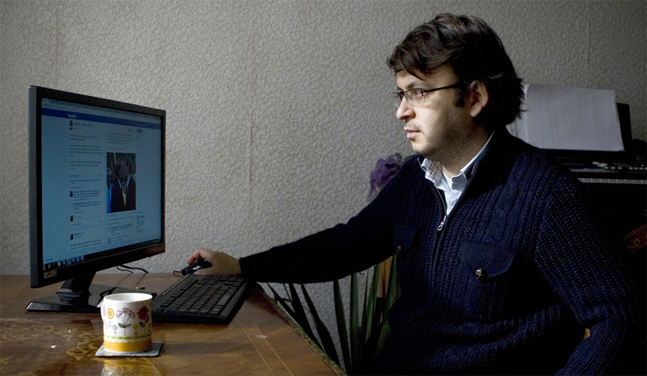 Emin Milli Milli recently learned that 15 Meydan journalists, himself included, are under criminal investigation on similar charges.
Emin Milli Milli recently learned that 15 Meydan journalists, himself included, are under criminal investigation on similar charges.
“People are afraid to do very basic journalistic activity because journalism is a crime in Azerbaijan,” said Milli. “We are having two different Azerbaijans in UNESCO today. How is it possible not to use this moment to address this issue directly with Goodwill Ambassador Mehriban Aliyeva and the president of Azerbaijan? You cannot be the goodwill ambassador of UNESCO and your husband keeping independent journalists getting the UNESCO prize in jail.”
Elsewhere in OCCRP’s coverage area of Eastern Europe and Central Asia, things have gone from bad to worse, according to journalists from partner organizations like Bivol in Bulgaria and KRIK in Serbia.
In Bulgaria, Bivol co-founder Atanas Tchobanov said that an estimated 70 percent of the country’s media outlets are connected with wealthy businessmen who have connections to organized crime groups, and that large infusions of European Union (EU) aid to Bulgaria are going to further corrupt the media. Reporters Without Borders placed Bulgaria at the bottom of EU countries in terms of press freedom and Freedom House classified the country as “not completely free.”
“The challenge for us is to find funding and stay independent and to resist pressure because of our work as investigative journalists,” said Tchobanov, who is also the spokesperson for Balkanleaks. That pressure in Bulgaria takes the form of anonymous threats and surveillance as well as threats of prosecution, he said.
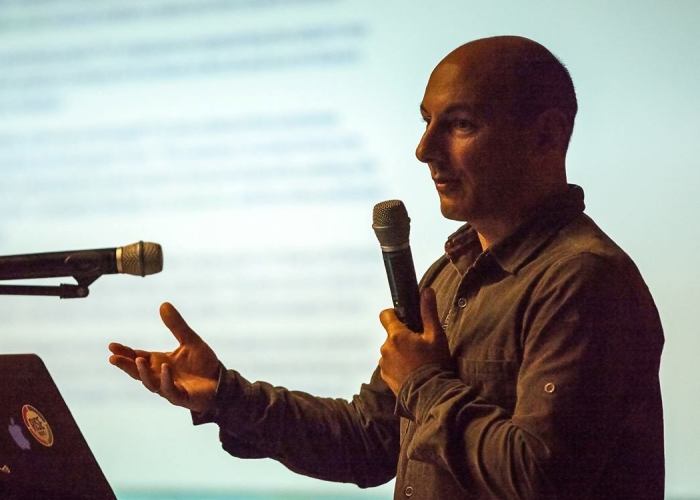 Atanas Tchobanov “We have been followed in many cases by people who are probably organized crime figures, and we have received threats and institutional attacks,” he said. After investigating a bank with bad practices, for example, Bivol was threatened with a fine of € 50,000 (US$ 57,700).
Atanas Tchobanov “We have been followed in many cases by people who are probably organized crime figures, and we have received threats and institutional attacks,” he said. After investigating a bank with bad practices, for example, Bivol was threatened with a fine of € 50,000 (US$ 57,700).
Tchobanov said a minister whom he investigated used his connections in the federal prosecution office to begin a case against him. While the suit was eventually dropped, the lawsuit enabled the government to begin surveillance of him, Tchobanov said. What has been worse, he said, are the libelous attacks in rival media on the journalists’ credibility.
This type of harassment is common, Tchobanov said, but some journalists experience more severe repression. One national television reporter, Genka Shikerova, had her car set on fire in 2014; more recently, a journalist in the town of Nessebar was beaten so badly after writing about corruption linked to the city’s mayor he was hospitalized for several days.
Stevan Dojcinovic of Serbian partner KRIK was pessimistic about the trends in his country.
“The situation is getting worse and worse, that’s obvious,” said Dojcinovic. “There’s more and more pressure on investigative reporters. We’re not going in a good direction.”
Dojcinovic, who was detained for 20 hours last year in a Russian airport and then deported after being invited to give a lecture at a journalism school in the country, has suffered similar pressures in Serbia.
Dojcinovic has seen his private conversations, both over the phone and in person, printed in rival newspapers, leading him to believe he is being tracked by the state’s Secret Service apparatus.
“It’s not possible to prove this but you see from things they publish” in newspapers that are close to the government, he said. “I can read my private conversations in the newspapers, or I see photos of me recorded by secret cameras, so I believe only state trackers can do this.” He says such conditions have made it difficult for him to do his job, as sources are reluctant to meet with him, fearing they will be exposed as well.
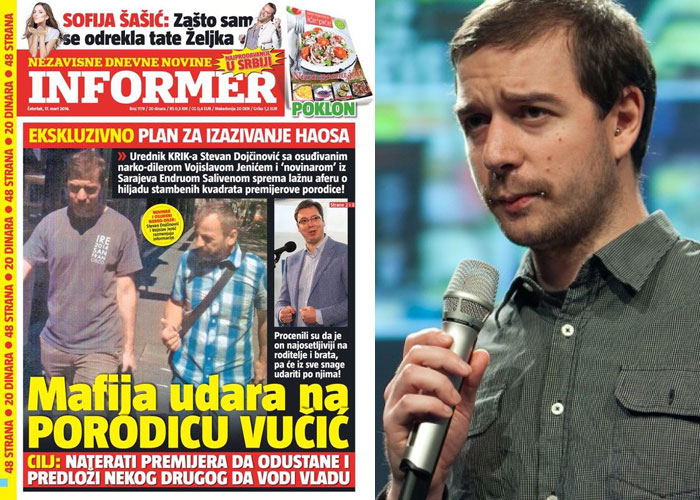 Stevan Dojcinovic As in Bulgaria, Serbian journalists have also been pilloried in rival newspapers after publishing investigative reports. “Usually when you investigate something or publish stories they start a news campaign against you, which is really difficult,” said Dojcinovic.
Stevan Dojcinovic As in Bulgaria, Serbian journalists have also been pilloried in rival newspapers after publishing investigative reports. “Usually when you investigate something or publish stories they start a news campaign against you, which is really difficult,” said Dojcinovic.
At the same time, he hastened to add, “We’re far from the conditions of Azerbaijan or Turkey. It’s very complicated to work under these conditions but at least we’re not being arrested.”
Iurie Sanduta, director of RISE Moldova, cited limited access to information as a major issue for Moldovan journalists. In most cases, authorities refuse to provide information in the public interest, always referring to personal data protection laws.
As a result, even some court decisions are excessively censored (for example, the name of the judge can be redacted). Additionally, most media in Moldova is owned by politicians or people connected to politics. As a result, many media professionals are limited in freedom of expression as they must follow the editorial policy or endure censorship in their newsrooms.
Recently, during research by RISE journalists, several persons, including representatives of the authorities, pressured them not to publish the article, Sanduta said.
Sullivan said that things will not get better unless governments support media politically and everyone works toward solving the financial limitations.
“When Khadija was arrested, the response from governments around the world was tepid. We need outrage or bad actors like Azerbaijan will keep arresting people. Remember, the best investigative reporters are released last,” he said.
Contact: Drew Sullivan, [email protected]
This article has been corrected on May 4, 2016 to reflect that Emin Milli is managing director of Meydan TV. OCCRP regrets the error.



